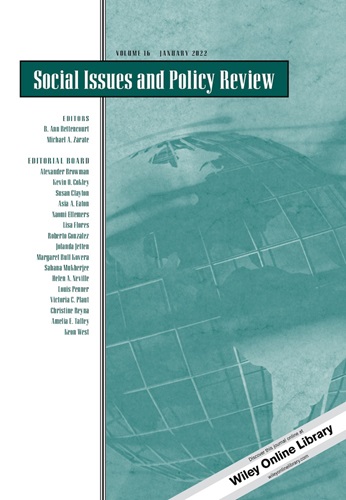教学作为社会影响:授权教师成为社会变革的推动者
IF 5.6
1区 心理学
Q1 PSYCHOLOGY, SOCIAL
引用次数: 17
摘要
教师在教育系统中扮演着多种角色。他们的主要角色是帮助所有学生发展知识和技能,但大多数时候,他们扮演着看门人的角色:他们根据学生的表现评估学生并进行选择。从社会影响的文献角度分析教师的角色,提出教学是社会影响的一种形式。我们回顾了现有的关于解释教师可能对学生的学习、学生的前景以及教育公平产生差异影响的机制的研究。这种方法可以帮助设计教师培训和学校改革,以最大限度地发挥所有学生的学习潜力,并使教师成为深刻的个人和社会变革的积极推动者。本文章由计算机程序翻译,如有差异,请以英文原文为准。
Teaching as Social Influence: Empowering Teachers to Become Agents of Social Change
Teachers carry out a number of roles in the educational system. Their primary role is to help all students develop knowledge and skills, but, most of the time, they take on the role of gatekeepers: They evaluate students and exercise selection on the basis of performance. We analyze the roles of teachers through the lens of the literature on social influence, and put forward the proposal that teaching is a form of social influence. We review existing research on the mechanisms that explain the differential effects teachers may have on students’ learning, students’ prospects and, therefore, educational justice. We conclude that if teachers endorse the role of mentors—instead of that of gatekeepers—focusing on the development of their students’ knowledge, they can promote deep study, long-term learning, and equality of treatment. Such an approach could help design teacher training and school reform so as to maximize the learning potential of all students and empower teachers to become active agents of profound individual and social change.
求助全文
通过发布文献求助,成功后即可免费获取论文全文。
去求助
来源期刊

Social Issues and Policy Review
Multiple-
CiteScore
22.20
自引率
1.10%
发文量
9
期刊介绍:
The mission of Social Issues and Policy Review (SIPR) is to provide state of the art and timely theoretical and empirical reviews of topics and programs of research that are directly relevant to understanding and addressing social issues and public policy.Papers will be accessible and relevant to a broad audience and will normally be based on a program of research. Works in SIPR will represent perspectives directly relevant to the psychological study of social issues and public policy. Contributions are expected to be review papers that present a strong scholarly foundation and consider how research and theory can inform social issues and policy or articulate the implication of social issues and public policy for theory and research.
 求助内容:
求助内容: 应助结果提醒方式:
应助结果提醒方式:


